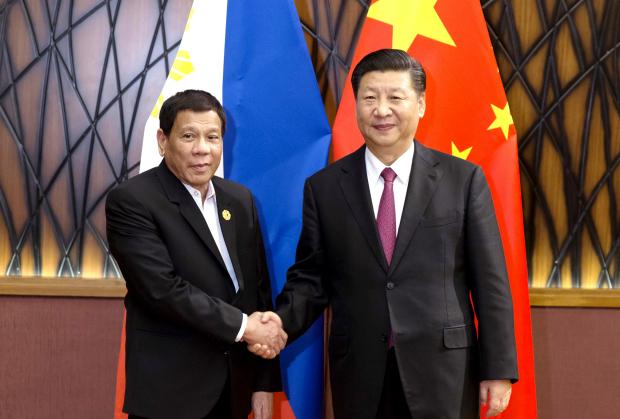Duterte and China: it’s worse than a “debt trap”
MANILA — “When we talk about ‘new colonialism,’” Malaysian Prime Minister Mahathir Mohamad told me in an interview earlier this month, “what the Chinese are doing is not exactly that, but it has the effect of reducing the freedom of action of other countries that owe China too much money.
I specifically raised the issue of “new colonialism” because that is the term used by the Malaysian maverick, in front of his half-embarrassed Chinese guests, during a state visit to Beijing last year.
“If you borrow huge sums of money, you [will eventually] fall under the influence and direction of the lender,” Mahathir lamented. He warned of the dangers of “enslavement” if the poorest and smallest countries suffer from a reduced “capacity to repay” Chinese loans.
Mahathir was of course referring to the “debt trap” phenomenon, which has a very precise definition. It essentially refers to a troubling fiscal situation, where a country’s share of external debt relative to the size of its economy (the debt-to-GDP ratio) far exceeds sustainable levels.
Malaysian Prime Minister Mahathir Mohamad listens during an interview with The Associated Press in Putrajaya, Malaysia, Monday, Aug. 13, 2018. Mahathir said he would seek to cancel multibillion-dollar infrastructure projects backed by China that were signed by his predecessor as his government. works to get out of debt. AP FILE
In Sri Lanka, the country was so indebted that it had to sell its precious port of Hambantota to a Chinese company in a century-old debt-for-equity settlement. As for Tajikistan, debt problems are said to have influenced its decision to cede 1,000 square kilometers of disputed land in the Pamir Mountains.
Many other countries in Africa and Latin America are also falling into the same trap. Venezuela may have sold a generation’s worth of its precious oil under similar terms. When it comes to the Philippines’ relations with the Chinese, however, the “debt trap” is NOT the real threat.
After all, our country has a good credit rating, a diverse pool of investors (in fact, Japan leads the pack), and a relatively large economy, especially considering the dearth of Chinese investment in infrastructure in the country.
Yet what we face could be far more sinister: undermining our sovereignty and sovereign rights in exchange for minimal and shoddy Chinese investment. This is what I call the “Chimera chimera”, namely the deployment of geopolitical concessions forward in exchange for false expectations of quality large-scale Chinese investment.
A cautionary tale
In my interview with Mahathir earlier this month, I spoke with him about our geopolitics the spirit of the times. At the astonishing age of 93, he was still impeccably sharp, clear-headed and forward-looking.
At the heart of our discussion is his perspective on China, in particular its trillion-dollar Belt and Road Initiative (BRI), which aims to transform the global infrastructure landscape in the image of China.
When I asked him if he had any advice for other nations, the ever-smiling Malaysian leader sternly warned against “endangering your own freedom” because of “the obligation too much money to China. The key word here, however, is “too much”.
READ: Ex-lawmaker sounds alarm over China’s onerous loan
LILY: PH does not fall into ‘China debt trap’, say key Neda officials
And in fact, that’s exactly what happened in the case of Malaysia, which has attracted nearly $100 billion in Chinese investment over the past decade. The result is a ballooning debt, which has reached $251 billion in recent years, in a country whose GDP is comparable to that of the Philippines.
But it wasn’t just the scale of Chinese investment. Many expensive projects have been negotiated with minimal transparency, questionable justification and under highly suspicious circumstances.
The situation deteriorated so much that Mahathir decided to give up any claim to political retirement and throw his hat in the ring at the age of 92! And, deftly exploiting widespread public grievances against Chinese investment, he won a stunning election victory last year.
True to his campaign promise, Mahathir immediately suspended nearly $20 billion in major Chinese investments, while launching the swift arrest of his former protege, Prime Minister Najib Razak, for corruption.
READ: Malaysian Najib Razak charged with corruption
Back to the future
The most interesting thing for a Filipino observer like me, however, is that almost exactly the same thing happened in the Philippines ten years ago. Remember the $329 million controversy over the Philippines National Broadband Network (otherwise known as the NBN-ZTE project)?
For some reason, however, we don’t seem to learn much even from our own contemporary history. To be fair, Chinese investments could be very beneficial, but with a caveat.
As Mahathir told me, we should welcome investment from China, as long as it is of high quality, focused on high-end manufacturing and services, traded under strict control, and offers jobs and opportunities for local workers and businesses.
READ: Shortage of water supply? China-funded Kaliwa dam would ‘absolutely’ help, says Dominguez
READ: Kaliwa dam deal is ‘suspiciously disadvantageous’ for PH
The reality, however, is that the Philippines was and probably never will be as attractive to Chinese investment as Malaysia, the resource-rich nation perched at the crossroads of the Straits of Malacca, the South China Sea and the Indian Ocean.
Among 10 proposed expensive Chinese infrastructure projects, only one, so far, has passed the preliminary stages of implementation. Nonetheless, some of our officials, including President Rodrigo Duterte, are triumphantly discussing the prospect of a boon to Chinese investment in exchange for our strategic acquiescence in the Western Philippine Sea.
LILY: Mahathir: China should define claims by South China Sea
Fortunately, we are not as small and vulnerable as Sri Lanka and Tajikistan in the debt trap. But thanks to Judge Antonio Carpio’s briefing, we now know that China seems to be demanding our national heritage assets and our sovereign territory as “collateral” for their loans.
There is nothing “standard” in this arrangement, since neither Japan nor any of our other major partners impose such conditions.
More importantly, unlike Sri Lanka, Tajikistan and other countries in Africa and Latin America, the Philippines has ongoing and extensive territorial and maritime disputes with China. Thus, the mere fact of agreeing to such loan repayment terms is very problematic.
It takes profound, perhaps even deliberate, ignorance to assume that China’s famous know-how does not connect its infrastructure investments to a larger geopolitical goal. And it is here that we should consider the wisdom of Mahathir.
(Richard Heydarian is the author of, among others, “Asia’s New Battlefield: US, China & the Struggle for Western Pacific” and the forthcoming book “The Indo-Pacific: Trump, China & the New Global Struggle for Mastery”. He writes a weekly “Horizons” column in the Philippine Daily Inquirer.)
Subscribe to our opinion newsletter

Read more
Subscribe to INQUIRER PLUS to access The Philippine Daily Inquirer and over 70 titles, share up to 5 gadgets, listen to the news, download as early as 4am and share articles on social media. Call 896 6000.





Comments are closed.